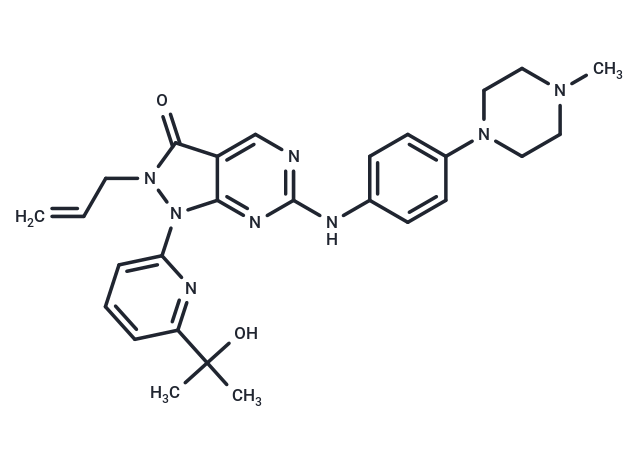Shopping Cart
- Remove All
 Your shopping cart is currently empty
Your shopping cart is currently empty

Adavosertib (MK-1775) is a small molecule inhibitor of the checkpoint kinase WEE1 (IC50: 5.2 nM). It hinders the G2 DNA damage checkpoint.

| Pack Size | Price | Availability | Quantity |
|---|---|---|---|
| 5 mg | $40 | In Stock | |
| 10 mg | $64 | In Stock | |
| 25 mg | $78 | In Stock | |
| 50 mg | $93 | In Stock | |
| 100 mg | $118 | In Stock | |
| 200 mg | $173 | In Stock | |
| 500 mg | $289 | In Stock | |
| 1 mL x 10 mM (in DMSO) | $44 | In Stock |
| Description | Adavosertib (MK-1775) is a small molecule inhibitor of the checkpoint kinase WEE1 (IC50: 5.2 nM). It hinders the G2 DNA damage checkpoint. |
| Targets&IC50 | Wee1:5.2 nM (cell free) |
| In vitro | MK-1775 (Adavosertib) inhibits phosphorylation of CDC2 at Tyr15 (CDC2Y15), a direct substrate of Wee1 kinase in cells. MK-1775 abrogates G(2) DNA damage checkpoint, leading to apoptosis in combination with DNA-damaging chemotherapeutic agents such as gemcitabine, carboplatin, and cisplatin selectively in p53-deficient cells [1]. Nanomolar concentrations of MK-1775 radiosensitized p53-defective human lung, breast, and prostate cancer cells but not similar lines with wild-type p53. Consistent with its ability to radiosensitize, MK-1775 abrogated the radiation-induced G? block in p53-defective cells but not in p53 wild-type lines [2]. |
| In vivo | Gemcitabine was administered to nude rats bearing WiDr (human colorectal) tumors at a dose of 50 mg/kg (i.v., bolus). Twenty-four hours later, MK-1775 was p.o. administered at a dose of 5, 10, or 20 mg/kg. Gemcitabine alone only moderately inhibited tumor growth. Cotreatment with MK-1775 significantly enhanced the antitumor effects in a dose-dependent manner and was well tolerated [1]. MK-1775 also significantly enhanced the antitumor efficacy of radiation in vivo as shown in tumor growth delay studies, again for p53-defective tumors [2]. |
| Kinase Assay | Kinase reaction was conducted with 10 μmol/L ATP, 1.0 μCi of [γ-33P]ATP, and 2.5 μg of poly(Lys, Tyr) as a substrate at 30°C for 30 min. Radioactivity incorporated into the substrate was trapped on MultiScreen-PH plates and was counted on a liquid scintillation counter [1]. |
| Cell Research | Tumor cells were cultured in 96-well plates and incubated with DNA-damaging agents for 24 h, then with MK-1775 and nocodazole for additional 8 h. For p-CDC2Y15 assay, cells were lysed and subjected in a colorimetric ELISA to determine the amounts of p-CDC2Y15 (1:100) and total CDC2 (1:200). For phospho-histone H3 (pHH3), cells were fixed with methanol, stained with anti-pHH3 specific antibody and bound antibody was stained with Alexa Fluor 488 goat anti-rabbit antibody. Images were acquired with an INCell Analyzer 1000 [1]. |
| Animal Research | Subcutaneous xenograft tumors were formed by injection of the human cancer cell lines in the hind flank of immunodeficient nude rats (F344/NJcl-rnu). To facilitate tumor formation, cells were injected in medium containing Matrigel, a solubilized basement membrane preparation extracted from the Engelbreth-Holm-Swarm mouse sarcoma. Gemcitabine, carboplatin, and cisplatin were dissolved or diluted in saline and were dosed i.v. MK-1775 was prepared in a vehicle of 0.5% methylcellulose solution and was dosed p.o. 24 h after dosing DNA-damaging agents. For efficacy studies, tumor volumes were measured with a caliper every 3 d and body weights were determined each weekday. Statistical analysis was done using repeated-measure ANOVA followed by Dunnett's test for relative tumor volume. T/C (%) was calculated as (ΔT/ΔC) × 100 if ΔT > 0 or (ΔT/TI) × 100 if ΔT < 0. ΔT was the change in mean tumor volume to the initial tumor volume for the treatment group, and ΔC was the change in mean tumor volume to the initial tumor volume for the vehicle control group. Ti was the initial tumor volume of the treatment group [1]. |
| Alias | MK-1775, AZD1775, Adavosertib (MK-1775) |
| Molecular Weight | 500.6 |
| Formula | C27H32N8O2 |
| Cas No. | 955365-80-7 |
| Smiles | C(C=C)N1N(C=2C(C1=O)=CN=C(NC3=CC=C(C=C3)N4CCN(C)CC4)N2)C=5N=C(C(C)(C)O)C=CC5 |
| Relative Density. | 1.292 g/cm3 |
| Storage | Powder: -20°C for 3 years | In solvent: -80°C for 1 year | Shipping with blue ice. | |||||||||||||||
| Solubility Information | DMSO: 50 mg/mL (99.88 mM), Sonication is recommended. 10% DMSO+40% PEG300+5% Tween 80+45% Saline: 7.4 mg/mL (14.78 mM), In vivo: Please add the solvents sequentially, clarifying the solution as much as possible before adding the next one. Dissolve by heating and/or sonication if necessary. Working solution is recommended to be prepared and used immediately. H2O: < 1 mg/mL (insoluble or slightly soluble) Ethanol: < 1 mg/mL (insoluble or slightly soluble) | |||||||||||||||
Solution Preparation Table | ||||||||||||||||
DMSO
| ||||||||||||||||

Copyright © 2015-2025 TargetMol Chemicals Inc. All Rights Reserved.